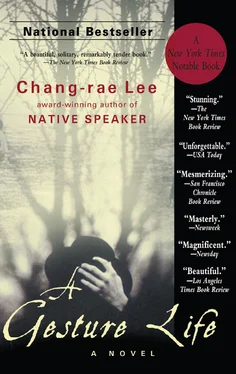Her expression turned instantly, not in mood so much as aspect, the way she gazed at me as though I had magically appeared from nothingness. She searched me with her eyes but did not speak, and as I walked to the infirmary she trailed me at a few meters, not from fear or deference but more as though trying to regard the whole of me. When we reached the building I directed her to the examination and surgery room and she went in without pause. As the doctor had generally instructed me, I was to “disinfect” her, treat her for anything she might have contracted en route to us, though of course without lab equipment and certain obvious symptoms it was impossible to tell anything with certitude.
With Captain Ono, in fact, it was more a point of “purity” than disease; he was particularly fastidious in his personal practices, as he was always groomed and shaved like any town physician, and most often took his meals alone in the officers’ mess, unless he was to dine there with the commander. I was surprised that he didn’t prepare his own meals, given his attitudes, for he was often disgusted with the general state of the camp and of the men, particularly now, when conditions were less than orderly. None of it could measure up to his private standards of cleanliness. The infirmary was of course a model of hygiene and efficiency, which I was most willing to maintain for him, despite his sometimes searing criticisms in this very room (and in front of others), which were aimed not at my specific conduct but at the legacies of my “training” and “background”—the ultimate question being of my ethos, as it were, a term (from his brief university schooling in England) that he seemed to employ often, for my edification.
In the surgery room, I had the girl sit up on the table. She watched me silently as I laid out the instruments, a swab and probe and speculum, with the uses of which, in all frankness, I had no experience whatsover. I had very briefly observed the doctor conducting such an examination, but my knowledge was relegated to the little I could remember of anatomy texts, with nothing of the practical. I hadn’t expected ever to treat a female in the course of my war service.
So I was ever more uncertain and confused. I also felt suddenly quite different. I had particular “feelings,” to be sure, though not necessarily or discreetly for her. At least not yet. Rather, these came in the manner in which one normally has a feeling, which I think is governed as much by context as by what is actually happening. And the context that early morning, before the camp had arisen and the day begun, before the resumption of everything having to do with wartime and soldiering, which is the grimmest business of living, was one I had not quite conceived, or experienced, before. There was no protocol I could pattern myself by. Of course one might point out that I had been with Madam Itsuda in Singapore, but there the situation was in fact wholly defined and contracted. K was a young woman, my same age — and in the almost civilian calm of the pre-reveille, with us set apart from all manner of order and rule, I realized I did not know how I should begin to comport myself with her, whether to be forceful or distant or kind. Finally I decided to put away the instruments and asked her if she had any sores or other outbreaks. She shook her head, and I decided not to give her a shot, which would make her terribly sick. I then handed her a vial of a simple cleansing solution, which I told her to mix with clean water and flush herself with several times in the next few days.
“You should go back now to get your things,” I then told her. “But return here directly.”
She nodded and stepped down from the table. I locked the cabinet of instruments and supplies, hearing the rustle of her rough-spun trousers as she was leaving the room. Normally I should have had to escort her, to prevent a possible escape, but there was nothing but hilly jungle and forest for many kilometers. One of the others had already attempted to leave after the first rounds with the officers but was eventually found some days later (and quite nearby), dehydrated and half-starved, and when she was recovered she was beaten very badly, as an example to the others.
But when I turned, K was still standing in the doorway. She had been watching me as I put away the supplies.
And then she said, quite plainly: “You are a Korean.”
“No,” I told her. “I am not.”
“I think you are,” she said, not looking away as she spoke. I didn’t know what to say. She sounded much more confident and mature in her own tongue than when she mumbled and half-whispered in Japanese. And there was an uprightness about her posture. Certainly I had an impulse to order her to be silent, harshly command that she leave immediately. But I felt unsettled by her forward bearing, as I was at once amazed and strangely intimidated.
I replied: “I have lived in Japan since I was born.”
She nodded and said slowly, as if testing my willingness, “But I think, sir, that most Japanese would never bother to learn to speak Korean as well as you do. And if they did know how, they wouldn’t reveal it. There are many Japanese settlers where my family lives, merchants and administrators and police, and this is how I know. When you first spoke outside, I thought it was my younger brother talking to me again. Your voice is just like his.”
I did not wish to go on conversing with her any longer, and yet I found myself listening to her closely, for it was some time since I had heard so much of the language, the steady, rolling tone of it like ours and not, theirs perhaps coming more from the belly than the throat. It was almost pleasing to hear the words, in a normal register. But her talk was also not vulgar or harshly provincial-sounding as was the other girls’; she was obviously educated, and quite well, and this compelled me even more, though it shouldn’t have. She seemed to sense this, and remained where she was standing, waiting for me to say something. I cleared my throat, but nothing would come out.
She then said to me, “I thought there was something different about you. I think you are not like everyone else.”
“I don’t know what you’re speaking of,” I said. “I’m a medical officer of the Imperial Forces, and there’s nothing else to be said. Yes, you are partly correct. I spoke some Korean as a boy. But then no more. Such things are not easily forgotten, and so I have the ability still. But this is none of your concern.”
“My Korean name is Kkutaeh,” she said, speaking over me. Her expression had brightened, her face wonderful to behold. “But I never really wanted the name. I’m the youngest of four daughters, so you can see how I got it. May I ask yours?”
“I don’t have one,” I told her immediately. But this was not exactly true. I’d had one at birth, naturally, but it was never used by anyone, including my real parents, who, it must be said, wished as much as I that I become wholly and thoroughly Japanese. They had of course agreed to give me up to the office of the children’s authority, which in turn placed me with the family Kurohata, and the day the administrator came for me was the last time I heard their tanners’ raspy voices, and their birth-name for me.
I said to her, “This is not necessary conversation.”
“I simply want to talk with you.”
“We have talked enough,” I told her, sitting down at the desk, with my back turned to her. “You’ll go now and get your things. When you return, you’ll remain in the other room, where I left you the blankets for your bedding. Please don’t disturb me further. I have much work to do today.”
“For Captain Ono?” she said.
“I have many duties, in various areas.”
“Will you tell me what he wants from me?” she said now, a little desperately. When I turned she was but an arm’s length away. I could smell the lingering air of a musky perfume, which Mrs. Matsui required the girls to wear. But compared to the sharp, sour reek of the men, even the tawdry scent was transporting. She asked, “Why has he kept me from what the others must do?”
Читать дальше











![William Frith - John Leech, His Life and Work. Vol. 1 [of 2]](/books/747171/william-frith-john-leech-his-life-and-work-vol-thumb.webp)
![William Frith - John Leech, His Life and Work, Vol. 2 [of 2]](/books/748201/william-frith-john-leech-his-life-and-work-vol-thumb.webp)